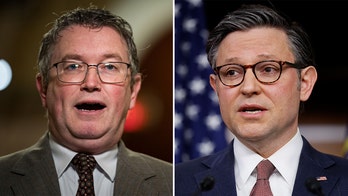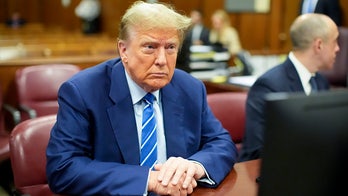"What's past is prologue." - William Shakespeare, The Tempest, Act II, Scene 1
House Majority Leader Eric Cantor (R-VA) caucused with reporters early Tuesday afternoon, just 25 minutes before ducking into another round of spending and debt limit talks with Vice President Biden.
"From my assessment it is crunch time in those meetings," Cantor said.
But few realized that "crunch time" would be the sound of the talks collapsing Thursday morning when Cantor abruptly withdrew from the negotiations. The Virginia Republican blamed the Democrats for failing to bend on a demand to raise some taxes, an issue Cantor argued was untenable to GOP rank and file.
But as Shakespeare wrote, "What's past is prologue." Certainly in Washington. And indeed that's the case with the debt ceiling discussions as the nation barrels toward an August 2 deadline which could result in a federal default.
Cantor's suggestion Tuesday that "crunch time" arrived may have been the first instance in this saga where past proved to be prologue." In fact in the same news briefing, Cantor even welded two instances of foreshadowing into the same sentence.
"It is crunch time now and it is time for the president to step up," Cantor said.
Cantor's declaration on Tuesday that the president must engage augured what the leader said Thursday when he bailed from the talks.
"It is up to the president to come in and talk to the speaker," Cantor told the Wall Street Journal.
But Cantor said something very similar at his Tuesday press briefing when pressed why President Obama should come to the table.
"When the president decides he want to go and seal the deal with the speaker, we will be ready for that to happen at whatever point he wants to," Cantor said.
So now it appears that if the sides are to find any agreement, it will be brokered by Mr. Obama and House Speaker John Boehner (R-OH), the most famous golf twosome in the country.
"And sadly, probably me," quipped Senate Majority Leader Harry Reid (D-NV).
What's past is prologue.....because suddenly any effort to find compromise and circumvent a default in August mirrors the bargaining between the president, Boehner and Reid earlier this year to avert a government shutdown. The dynamics and political atmospherics are strikingly similar, too.
For starters, Republicans believe it was important to inject the president into these talks. For one, that puts Mr. Obama on the hook since he has as much at stake as anyone as his re-election campaign creeps closer. But if history is our guide, it also means that having the president at the table could enhance the chances of an agreement.
It was the president who cut a deal late last year to renew the so-called "Bush" tax cuts. And according to Cantor, taxes are the issue now. President Obama's decision to side with Republicans on the Bush tax arrangement infuriated Democrats. But if there's to be a deal, perhaps Republicans feel they have better chances working with the president than the likes of Biden or the other two House negotiators, Assistant Minority Leader Jim Clyburn (D-SC) and Rep. Chris Van Hollen (D-MD).
Remember, in the tax deal negotiations, President Obama infuriated House Democrats when he rather unceremoniously dumped them and carved his deal with Republicans. This time, the Biden talks were deadlocked not only over taxes, but over a reluctance by Democrats to accept certain cuts.
House Minority Whip Steny Hoyer (D-MD) put it best on Tuesday.
"It's hard to see how you get to $2 or $4 trillion in reductions without revenues or Draconian cuts that Democrats would not support," Hoyer said.
Democrats were fighting for their spot at the table Thursday after leaving a meeting at the White House with Mr. Obama.
"The president, as always, was very concerned that deficit reduction be a priority for all of us, that he knows that serious reduction can only take place in a bipartisan and balanced way," said House Minority Leader Nancy Pelosi (D-CA).
House Democrats will be crucial to delivering enough votes on a package to raise the debt ceiling. However, the GOP brass needs to deliver a solid base of its conference to put the bill in striking distance of passage. So far, the Republican leadership is finding that the rank and file aren't ready to bite.
So this got "kicked upstairs," as they say.
Again, we're back to foreshadowing.
The president, Boehner and Reid comprised the same trio that fashioned the deal to keep the government open in April. On the ultimate vote to avoid a government shutdown, House Republicans delivered most of their membership, but still lost 59 of their own. They needed Democrats to pass the measure. If tailored properly, a debt ceiling vote would need a similar voting coalition to cross the finish line.
There's another component that mirrors the government shutdown scenario: brinksmanship.
Lawmakers and the administration had months to avoid a shutdown. But finally, lawmakers indicated they wouldn't agree to any more stopgap extensions. By early April, the government was just hours away from closing down.
Until the 11th hour.
In this case, many observers anticipated the decision by Cantor and later Senate Minority Whip Jon Kyl (R-AZ) to push back from the talks as inevitable. In fact, there was talk that the Biden Group could hash out an arrangement by the end of this week. That would give legislative technicians more than a month to draft the bills which might comprise a debt limit and spending reduction package. Plus, it would give both sides time to sell the deal and conjure up necessary votes.
But that won't happen now. Which means these negotiations between the Big 3 will be intense as the August 2nd deadline breathes down their necks.
That's exactly what happened as they sprinted to keep the government open for business.
What is past is prologue...
This also turns up the heat on John Boehner.
In the late winter and spring, it was written that Boehner had the most to lose in crafting an agreement to fund the government yet not alienating too many GOP, tea party backed lawmakers.
Boehner threaded some serious needles that time.
He'll be asked to do it again.
It was a strategic decision by Boehner to appoint Cantor as the lead House Republican negotiator to the Biden Group. For one, it relieved pressure from the speaker who suffered some bruises during efforts to prevent a government shutdown. Boehner ultimately told his rank and file that the arrangement to slash $61 billion was the best deal he could get.
Many Republicans grumbled that the cuts should have been deeper. Many others were happy to shutter the government altogether.
That fight cost Boehner some political capital. But with Cantor abandoning the negotiations, Boehner's again in the driver's seat. And he has to market any pact to those freshmen. Just like last time.
What's past is prologue....
Late last week, Vice President Biden unexpectedly jawboned with reporters in a hallway in the Senate wing of the Capitol. Biden updated the scrum on the status of the talks. And the vice president sounded as though he might be talking about the arguments over the government shutdown a few months ago.
"There's going to be some Democrats who'll vote for none of cutting anything. There's going to be some Republicans who won't vote for anything at all. I mean you've got people voting against deals because it didn't save 60 zillion dollars," Biden said.
Those were the same dilemmas the sides faced just a few months ago as a government shutdown swung in the balance. There were intractable differences. The same players at the negotiating table. And a looming deadline.
The political Doppler detects another storm brewing.
And perhaps it's only appropriate that Shakespeare penned the "past is prologue" line in The Tempest.




